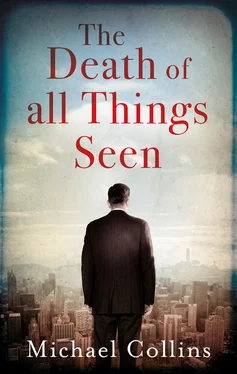*
Time was running out for Helen Price.
She had started to think of herself again in the third person, remembering how she self-consciously had identified herself as Helen Price when first married, writing out her signature over and over again with a trembling adult resolve, and now to come upon that name again, Helen Price , her name, and all that it once represented, and to think of it on a headstone.
She felt her eyes blur. She remembered how the end had ignominiously started in the nadir of an itinerant Thanksgiving at a suburban Red Lobster less than a year ago, a compromise in the absence of a family, an experience so unsettling it had set her and Walter on the high seas a month later for a lavish Christmas Caribbean cruise ultimately overshadowed by a low grade salmonella outbreak linked to a dubious barrier reef buffet of crustaceous delights. It was the persistence of stomach pains in the months after the cruise that had augured all was not well with her. Cancer was in her uterus and then in her lungs.
How often had she thought, what if she had never gone on the cruise? The entire fiasco opened up again, the Medevac rescue efforts off the coast of St Croix, a quotient of elderly summarily helicoptered to an island hospital for precautionary reasons, her included, and against her better judgment. A month later she had discovered that travel insurance had not covered the six-minute airlift, the Medevac outfit billing an astronomical $11,000 to their credit card.
*
Helen turned after crossing the Chicago River, edging along Upper West Wacker. She knew she should have turned earlier onto Superior, toward the vast medical complex of Northwestern Hospital and the Oncology office of Dr Marchant.
Instead, she followed the contour of the river’s bend. She wasn’t going to Dr Marchant’s office. She gave herself to this truth, lost in the elongated fall of shadows. She passed across gelled bars of afternoon light intersecting the East / West streets in a roll call of presidential names — Washington, Madison, Monroe and Adams — before turning east again toward the lake on Jackson, crossing Franklin until she finally passed the intersection of La Salle. This was where she had worked until 1992, the ground zero of her existence.
She craned forward. Above her, two hooded figures stood atop the Mercantile Exchange, an Egyptian grasping a sheaf of wheat and a Native American holding an ear of corn. Time seemed to have stopped here. The commodities exchange and the Federal Reserve Bank belonged to another age, to a time when the nation’s wealth had been tied to the Gold Standard, to a cache of gold set against the float of currency.
‘There you go again!’ she heard Norman say in her head. And yet it meant something to her. It defined the way she had experienced life for so many years, the ticker tape of futures tied to the breadbasket of grain, cereals, and soybeans grown out on the great plains of Oklahoma and Nebraska, to the dairy farms in the glacial moraines of Wisconsin and Minnesota, the railway yards of livestock movement, the trundling shunt of railway gauges coupling and decoupling, trains snaking out toward the East, South, and West.
Maybe it was just nostalgia, the same story generationally played out time and again, but no, it was different! The slippage all the more stark now in this new age of informational management and digital superhighways, in the Wi-Fi bandwidth of things unseen, in the derivatives markets tied directly to Walter’s retirement account, based on what exactly? Calculated wagers securitized against something.
Helen felt a shudder run through her. Was there ever such a sense of loss as the one she now experienced? In times past, be it plague, famine, war, or simply the wrath of God, there was some sense of an ending and reasonableness to it. She thought of Lot, walking away from all that had come before, but toward a future. That was the difference, the prospect of hope, of a new beginning.
*
Helen was willing to admit to her own failings. It was just her perception, her way of seeing the world. She felt the need to defend herself again. No, nothing made sense anymore. Not really. She felt her lips forming the name Theodore Feldman, reeling in time again, finding a way back to the most distant and yet respected man she had ever known. Mr Theodore Feldman, distinguished, decorated veteran of World War II. He called the Japanese ‘Gooks’, his one betrayal of his personal history in the Pacific carnage. Where had men like that gone, men of means, manners, and material substance? She knew where. Life detached from a fading, tangible, older world of physical materiality; life lost to a digital age.
She recalled fondly the arterial vacuum suction tubes running through her office building. This was how commerce had worked once upon a time, in the hive of corporate activity, with its division of labor between the sexes and ages. Memos materializing as items of substance, memos first taken down word for word in a cryptic shorthand secretarial script, then passed on and typed up by pools of girls.
It still existed within her mind, the gurgle of the water cooler serviced by that lifelong Culligan Man in his dickey bow and crisp white short sleeved shirt with the hitched polio limp passed off as a war injury. She observed all this sitting in an outer office of bubbled privacy glass, opening the morning mail with a dagger of a letter opener, screening all calls for Mr Feldman until he buzzed and called her in, whereafter she spent the greater part of her day transcribing, pen and pad in hand.
She remembered, too, how Mr Feldman strode back and forth punctuating his ideas with a series of affectations that perhaps even he was unaware of inhabiting, stopping mid-stride in a slanting sunlight, then shifting into the colder grey of more rational deliberation, moving to and fro in a mental cursive of looping patterns through the office, finding his way toward some coherent thought.
She could almost smell his aftershave and how, through all of it, she had remained an undeniable physical presence into which she had allowed Mr Feldman to pour his professional expertise. At times, Mr Feldman looking askance in her direction, at the way she shifted ever so slightly, whereupon he subtly readjusted a phrase, because of her influence, her presence — who knew, really?
She thought if she were to explain the business memo process, if there was something she could pass on to this new generation, it would undoubtedly include reference to this spatial sense of awareness, this fluid movement in time, this assemblage of thoughts found here and there in the touchstone of physical things and spaces. Yes, that was it, her sense of physical presence in time.
And there were other memories. That time Mr Feldman took to using a gold-plated putter that came with one of those automatic cups that spat the ball out again and again, a corporate Christmas gift when such tokens were expected, Mr Feldman sighting up his points of managerial reprimand for the salesmen in the field, a series of balls hit in slow, methodical succession, the ball’s silent roll across the billiard green of the carpet.
She remembered, too, the speeches Mr Feldman spent days constructing for the board of trustees. The attenuated way he had of coming to subtle points regarding the general running of the company. Mr Feldman looking off toward Lake Michigan for a word or phrase to capture a thought just so. The old-world, soft-shoe way he had of speaking around and not particularly to an issue, circumscribing points of business suggestive enough to land upon the overall challenges, but lest anybody forgot, for this was a nation of optimists, the opportunities that still existed — remarks that always inspired the corporate board members to nod approvingly amidst desserts and cognac, leading to furtive considerations concerning drinks elsewhere — Mr Feldman politely retreating and placing a jocular call to the office with uncharacteristic warmth in the hum of accomplishment to ensure the office, as he put it, ‘hadn’t burned down!’ A remark that always made Helen flush.
Читать дальше












